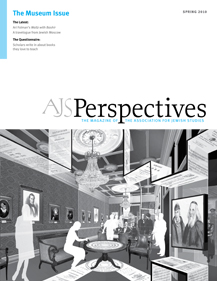Dear Colleagues,
It is a distinct honor for me to serve as the new president of AJS. When I joined AJS in the mid-1970s as a graduate student, we were a small but dynamic organization, and going to the annual conference was exciting. There was one session at a time, so everyone went to sessions outside their own field and got to know the scholars and the intellectually stimulating work they were doing. It was obvious that Jewish studies had an exciting future in the academy, and I for one felt proud to be part of a scholarly world with a long pedigree, high standards, and cutting-edge research agendas. I am a modern historian, but I loved the fact that I knew a great deal about the scholarship in Bible, Rabbinics, Hebrew and Yiddish literature, and all the other fields of Jewish studies. AJS has grown enormously since those days, and that is a good thing, even if it means that most people cannot follow the scholarly debates in fields other than their own. Indeed, the sheer variety of papers at the last AJS conference in Los Angeles impressed upon me the vitality and energy of Jewish studies. It's still exciting for me to attend the AJS conference.
One of the most interesting developments of the past decades has been the growth of new fields within Jewish studies. Some of these fields parallel developments in the academy generally like gender studies and cultural studies; some fields (like Jews and the arts) recognize that Jewish studies should not be confined to texts or history. One of the most dynamic new fields within Jewish studies in recent years—Israel studies—is the result of the recognition that Israel, the Jewish state which has existed for over sixty years, also forms a central part of Jewish studies, and must be studied using the rigorous tools of the critical scholar. Obviously we have studied Israel before. Hebrew literature specialists and social scientists have long studied aspects of Israeli culture, society, and politics, and historians have entered the field as the archives have opened. But until recently many students of Israel, especially the social scientists, I think, did not view their work as belonging to Jewish studies. Instead, they went to the social science conferences and gave papers about Israel as case studies of general political or social phenomena. They still do that of course, and they should, as good social scientists, but they also now find a home within Jewish studies, sharing the fruits of their scholarship with the rest of us, and that is a very good development.
With all this growth, with all this expansion in fields and concerns, is there anything which unites Jewish studies as a field? I don't think that Jewish studies is a single academic discipline, with a shared methodology or approach. Jewish studies contains many disciplines, including history, literature, religious studies, cultural studies, philology, and the social sciences. Despite all the popular talk about the end of disciplines and the value of interdisciplinary studies, in fact, disciplinary approaches still retain significance and validity, and we should not disparage them. Yet, by its very nature Jewish studies is quintessentially interdisciplinary in the best of all possible ways, respecting disciplinary difference but fully committed to the benefits of crossing disciplinary boundaries for the sake of scholarly analysis. So, Jewish studies is not a discipline, but neither is it an example of "area studies," like American studies. After all, we are studying a group of people and its culture over thousands of years and in radically different cultural contexts. What unites all of us in Jewish studies is an interest in a particular group of people—the Jews—and their culture broadly defined over a very long period of time. We would all agree that the Jews and Jewish culture are very interesting and compelling, and studying them raises central questions about the very nature of human culture, human identity, and human interaction.
So, why don't we go to sessions outside of our areas of specialization when we attend the AJS conference? Perhaps many of us do. Perhaps it is also inevitable that with the growth of our field and the expansion of our scholarly activities we focus more narrowly on our own areas of specialization. I do hope, though, that many of us will make the effort to attend sessions outside our fields. Naturally, I am delighted that our field continues to grow and prosper. I just wish I still had the time to go to sessions outside my field at AJS annual meetings.
Marsha Rozenblit
University of Maryland

